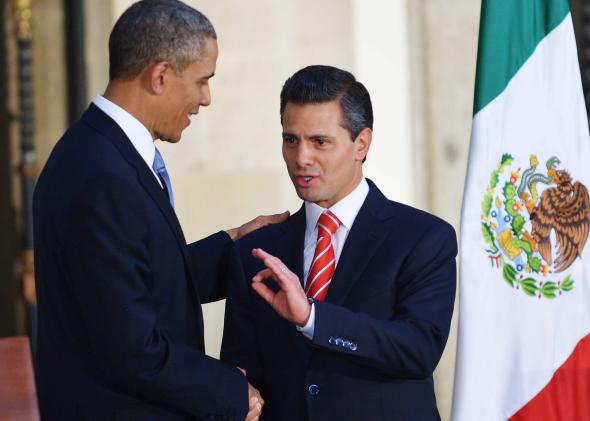There doesn’t seem to be any let-up in the scoops coming out of Edward Snowden’s NSA files. Over the weekend, in addition to a Le Monde report alleging that the U.S. intercepted more than 70 million French phone calls, an article in Der Spiegel reported that the NSA had hacked into the e-mail domain used by former Mexican President Felipe Calderon and his cabinet and monitored the cell phone communications of current President Enrique Pena Nieto while he was a candidate.
What makes Mexico a bit different is that it’s been clear for a while that the government has allowed extensive U.S. intelligence activity on its soil. The news comes at a time when Mexico was already discussing scaling back its extensive security cooperation with the United States. Under Calderon, Mexico has been building up its own intelligence apparatus , likely with significant help from Washington. In 2012, for instance, the U.S. State Department awarded a contract to provide Mexico’s Public Security Secretariat with a system designed to facilitate “the timely receipt, processing, analysis and storage of communications from the national telephonic and other communications service providers in Mexico”.
There have been reports in the Mexican media for years of U.S. agencies including the CIA; the FBI; the Department of Homeland Security; the Treasury; the Bureau of Alcohol, Tobacco and Firearms; the National Reconnaissance Office, the NSA; the Defense Intelligence Agency; and the Drug Enforcement Agency operating on Mexican soil under the auspices of the Merida Initiative, the security cooperation agreement between the two countries aimed at fighting drug cartels.
An article by Dana Priest of the Washington Post earlier this year discussed the extent of this intelligence cooperation during Calderon’s presidency:
The administration of former president Felipe Calderon had granted high-flying U.S. spy planes access to Mexican airspace for the purpose of gathering intelligence. Unarmed Customs and Border Protection drones had flown from bases in the United States in support of Mexican military and federal police raids against drug targets and to track movements that would establish suspects’ “patterns of life.” The United States had also provided electronic signals technology, ground sensors, voice-recognition gear, cellphone-tracking devices, data analysis tools, computer hacking kits and airborne cameras that could read license plates from three miles away.
Under a classified program code-named SCENIC, the CIA was training Mexicans in how to target and vet potential assets for recruitment and how to guard against infiltration by narco-traffickers.
According to a 2011 New York Times article, the Mexican government was often kept out of the loop about the extent of U.S. intelligence operations in the country:
As the United States has opened new law enforcement and intelligence outposts across Mexico in recent years, Washington’s networks of informants have grown there as well, current and former officials said. They have helped Mexican authorities capture or kill about two dozen high-ranking and midlevel drug traffickers, and sometimes have given American counternarcotics agents access to the top leaders of the cartels they are trying to dismantle.
Typically, the officials said, Mexico is kept in the dark about the United States’ contacts with its most secret informants — including Mexican law enforcement officers, elected officials and cartel operatives — partly because of concerns about corruption among the Mexican police, and partly because of laws prohibiting American security forces from operating on Mexican soil.
Given the extent of U.S. intelligence activities within the country, and the Americans’ distrust of Mexican law enforcement, it shouldn’t really be shocking that some of these resources were deployed against the Mexican state itself. It’s possible Pena Nieto, who took office last December, may have had an inkling of this when he issued new restriction on intelligence sharing between the two governments in July.
As with the revelations about spying on the Brazilian government, the diplomatic damage is likely to be fairly short-lived here. The economic and security ties between Mexico and the United States are simply too deep. But future Mexican governments may be less enthusiastic about handing over the keys to spies from north of the border.
